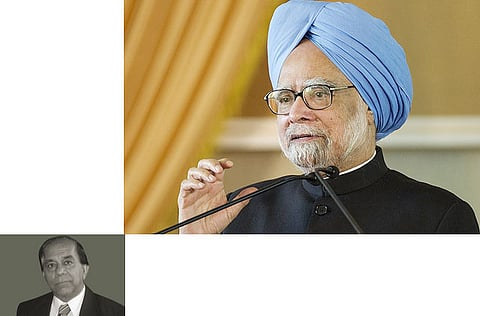Firm steps needed to fight corruption
On Independence Day, India's 1.2bn people are angry and cynical about widespread graft

As India celebrates its 64th independence anniversary today, Indians are pensive, angry and cynical about the proliferating corruption in their country. The culture of sleaze and high inflation have produced what critics ridicule as ‘stinkflation'.
Manmohan Singh, the Indian Prime Minister, was a brilliant finance minister who heralded the much-needed reforms in India nearly two decades back. But his leadership qualities as prime minister are being increasingly questioned as he is unable or unwilling to act against the corrupt, unscrupulous and greedy politicians around him, thus eroding his credibility.
Accustomed since decades to paying bribes to get even simple things done, Indians now view corruption as a very serious challenge to their freedom. Many Indians want those found guilty of corruption to be punished with life imprisonment. Not surprisingly, the anti-corruption campaigner Anna Hazare has emerged as the nation's hero with his simple Gandhian message of truth. India's powerful but corrupt political elite appears dwarfed before this small man. All sections of Indian society are bristling with anger against politicians, bureaucrats and others for their obnoxious attitude that they are above accountability.
The Hazare camp insists that the prime minister himself should come under the Lokpal (ombudsman) scanner. Baba Ramdev's forcible eviction from Delhi two months ago during a yoga gathering which the government called an unauthorised political assembly, has harmed India's image as the world's largest democracy that respected free speech. Indeed, the US State Department spokeswoman Victoria Nuland urged India to respect the democratic rights of peaceful demonstrators against corruption, angering Singh's government which thought it would never be publicly chastised by an important ally.
Thieves in high places
Given the prime minister's unwillingness to come under the Lokpal scanner, a referendum could help decide the issue but that step could shake the foundation of the government. Sycophants and powerful cabinet ministers are terrified by this prospect.
A political career is considered to be the fastest vehicle to gain influence and get rich quickly in India. The list of corrupt politicians who have made huge pecuniary gains is very long. Politicians have stooped so low as to steal low-cost apartments in high-rise buildings in Mumbai's prime real estate, promised to widows of soldiers who died for the country. Delhi's Commonwealth Games are pilloried as Suresh Kalmadi's ‘commission-wealth games'. Then there is A. Raja, the former telecommunications minister, who sold licences much below their value, causing some $40 billion (Dh147 billion) losses to the Indian state, according to the Comptroller and Advocate General's report. The impasse between Hazare and the Indian Government over the Lokpal bill could polarise the country along ‘us-and-them' lines, with ‘us' being the people of India and ‘them' being politicians and bureaucrats who have engaged in thievery and plundering.
India's politicians, including those from the opposition BJP and other parties, should refrain from just scoring points over each other, and place national interest above petty political gains. Singh, watched over the shoulder by the ‘prime minister in waiting' Rahul Gandhi, needs to crack the whip, failing which his other well-meaning work would come to naught.
Singh's traditional Independence Day speech at the historic Red Fort in Delhi would sound like a self-glorifying recital of his government's achievements if he failed to announce firm measures to eradicate corruption. Singh's well-meaning — but strategically misplaced — zeal to achieve a breakthrough with Pakistan at any cost could be dismissed as a mere ploy to divert attention from the central problem of corruption. Pakistan, which recently extradited a notorious terrorist to Indonesia where he was wanted for the Bali terrorist attacks, should extradite those wanted in India for terrorist and criminal activities.
India could offer trade and investment benefits to Pakistan if it dismantled alleged anti-India networks on its soil. Pakistan could also learn a lesson or two from China's dealings with India. Though China and India have their share of problems, these are never allowed to escalate because of growing trade, business and prosperity. Interdependence is the mantra to greater mutual tolerance of the two rival countries.
US Secretary of State Hillary Clinton recently urged India to play a much bigger role on the international stage, even though she was clearly eyeing US interests.
China abhors the idea of a resurgent India locked in a US embrace. But China could get a positive Indian response if it stopped needling India on issues such as visas for Kashmiris, Arunachal Pradesh, military support for Pakistan, building a ‘strategic noose' around India by increasing its presence and influence in India's neighbourhood, etc.
If China continued to needle India, the latter could respond by allying with countries such as Vietnam and the Philippines in the disputed Spratly Islands in the South China Sea, upgrading relations with Taiwan in repudiation of the ‘one-China' policy, elevating the status of the Dalai Lama, etc. India, freshly elected as president of the UN Security Council, could take a pro-active approach in the Middle East. It made a diplomatic demarche to Syria a few days back when it sent a senior diplomat Dilip Sinha, accompanied by Brazilian and South African diplomats, to Damascus to find a way out of Syria's political morass.
Manik Mehta is a commentator on Asian affairs.


